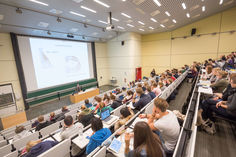Research Project of the Wilhelm Sander Foundation
Project Management
Chromothripsis as a Mechanism of Clonal Evolution in Acute Myeloid Leukaemia (AML)
Background: In addition to the gradual accumulation of genetic aberrations, a mechanism known as chromothripsis appears to be of pathogenetic importance in the clonal development of leukaemia cells – a process in which chromosome fragmentation occurs, leading simultaneously to multiple chromosome aberrations.
Objectives: Aim of our planned project is to elucidate the role of chromothripsis in the clonal karyotype development in AML, and thereby improve our understanding of the cause and development of cytogenetic aberrations in AML.
Approach: Our aim is to further investigate Chromothripsis in AML with respect to the following questions: (i) frequency in cytogenetic and molecular genetic subgroups, (ii) prognostic relevance, and (iii) mechanistic significance for the development of specific AML-type chromosomal aberrations. In addition to SNP/copy number array analyses, molecular cytogenetic banding methods (cross-species-colour-banding-FISH, Multicolour-Banding-FISH) will be established for the first time for routine detection of chromothripsis. Our goal is to identify cytogenetic patterns arrising as a result of chromothripsis. In particular, we aim to investigate karyotypes with marker chromosomes - chromosomes which due to numerous rearrangements cannot be unambiguously identified, as we assume that chromothripsis may explain their origin.
Scientific Team Members
Dr. med. Martin Granzow
Dr. med. Mutlu Kartal-Kaess
Technical Assistants
Brigitte Schoell
Kooperationspartner:
Prof. Dr. med. H. Goldschmidt
Leiter der Multiplen Myelom Phase III Multicenter-Studie (GMMG-HD4),
Medizinische Klinik V, Universitätsklinikum Heidelberg,
Im Neuenheimer Feld 410, D-69120 Heidelberg
Dr. med. Uta Bertsch
Studienärztin, Leiterin des Studiensekretariats,
Medizinische Klinik V, Universitätsklinikum Heidelberg,
Im Neuenheimer Feld 410, D-69120 Heidelberg
Prof. Dr. Peter Lichter
Leiter der Abteilung für Molekulare Genetik, Deutsches Krebsforschungszentrum,
Im Neuenheimer Feld 280, D-69120 Heidelberg
Selected publications
- Bochtler, T. et al. Clonal heterogeneity as detected by metaphase karyotyping is an indicator of poor prognosis in acute myeloid leukemia. Journal of clinical oncology : official journal of the American Society of Clinical Oncology 31, 3898-3905, doi:10.1200/JCO.2013.50.7921 (2013).
- Heilig, C. E. et al. Chromosomal instability correlates with poor outcome in patients with myelodysplastic syndromes irrespectively of the cytogenetic risk group. Journal of cellular and molecular medicine 14, 895-902, doi:10.1111/j.1582-4934.2009.00905.x (2010).
- Neben, K., Giesecke, C., Schweizer, S., Ho, A. D. & Kramer, A. Centrosome aberrations in acute myeloid leukemia are correlated with cytogenetic risk profile. Blood 101, 289-291 (2003).
- Kramer, A., Neben, K. & Ho, A. D. Centrosome replication, genomic instability and cancer. Leukemia 16, 767-775 (2002).
![[Translate to English:] [Translate to English:]](/fileadmin/_processed_/8/2/csm_20131204_Beratung_035_a396c6c6e5.jpg)
![[Translate to English:] [Translate to English:]](/fileadmin/_processed_/a/0/csm_20170627_PflegeOrtho_001_fb912471fa.jpg)
![[Translate to English:] [Translate to English:]](/fileadmin/_processed_/f/c/csm_20170215_LaborOMZ_155_c0169c0898.jpg)
![[Translate to English:] [Translate to English:]](/fileadmin/_processed_/2/c/csm_20180523_Labor_139_6ebb9a0a1b.jpg)

